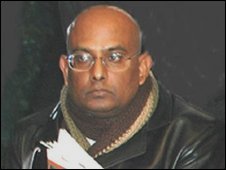The head of the Tamil Tigers in Britain was found guilty, April 17, of supplying bomb-making equipment for the Sri Lankan terrorist organization.
He was buying bomb-making equipment for the terrorist group while holding regular meetings with Special Branch, it has been revealed, Times Online UK reported.
Arunachalam Chrishanthakumar, known as AC Shanthan, became the first person to be convicted (April 17) of aiding the Liberation Tigers of Tamil Eelam (LTTE) since the British Government declared them an illegal terrorist group in 2001. 
Chrishanthakumar, a property valuer from Norbury, South London, bought electrical components seen in remote-controlled bombs used by the guerrilla force fighting a civil war in Sri Lanka.
Media reports said details of links between the Tamil Tigers and the British authorities were revealed during a nine-week trial at Kingston Crown Court.
LTTE representatives had frequent meetings with the Foreign and Commonwealth Office and Chrishanthakumar regularly met Special Branch officers and was contacted by MI5 as part of efforts to monitor the 300,000 Tamils living in Britain, the court was told. Clare Short, the former International Development Secretary, appeared as a defence witness and told the court that the Government gave millions of pounds in humanitarian aid to areas of Sri Lanka controlled by the Tamil Tigers during a four-year ceasefire that ended in 2007.
The court heard that from the early 1990s Chrishanthakumar had been head of the United Tamil Organization (UTO), based in Bermondsey, South London, which was regarded as the public face of the Tamil Tigers in Britain. When support of the LTTE and the UTO was made illegal he became leader of the British Tamil Association, which he insisted was separate from the guerrilla organization.
Jonathan Laidlaw, QC, for the prosecution, told the court that Chrishanthakumar, 52, was effectively head of the LTTE in London. “He was coordinator of the procurement exercise. He was in contact with senior LTTE figures in Sri Lanka, receiving orders and requests, and on occasions buying equipment himself,” he added.
In 2004 Special Branch officers discovered that Chrishanthakumar had bought items including handcuffs and boots for the Tamil Tigers’ police force from an army surplus shop in Southsea, Hampshire. He was not arrested but agreed to stop buying such items, the court heard.
However, it was alleged that he was later ordered by the LTTE leadership in Sri Lanka to buy laptop computers, printed circuit boards, remote control equipment and satellite equipment.
Mr Laidlaw said: “Certain of the electrical components are of a sort which are used by the LTTE in improvised explosive devices, the bombs which were targeted at government forces.” Chrishanthakumar also bought small, high-powered magnets of the sort that have been used to attach limpet mines to Sri Lankan naval vessels, he said.
The Tamil Tigers first used a remotely controlled explosive device in December 2005. In the next 12 months they successfully used 70 such devices against government forces and politicians.
Chrishanthakumar was convicted of conspiracy to receive property to be used for the purposes of terrorism and possessing military manuals for terrorist purposes.
The jury failed to reach a verdict on three charges against Chrishanthakumar: receiving military equipment and outfits, receiving money and belonging to a proscribed organization.
They also failed to agree on a charge against Jagatheeswaran Muraleetharan, 46, from Powys, Mid Wales, of receiving electrical components for the purposes of terrorism. His brother, Jeyatheswaran Vythyatharan, 40, also from Powys, was cleared of the same charge after the nine-week trial.
Murugesu Jegatheeswaran, 34, from Mitcham, South London, was found not guilty at an earlier stage of receiving electrical components for the purposes of terrorism.
The Crown Prosecution Service will decide next week whether to seek a retrial on outstanding charges
It is also reported that the pro-LTTE organization headed by Chrishanthakumar, together with other such groups were responsible for organizing the recent violent demonstrations in London against the Sri Lanka Government, and seeking to pressure the UK Government to act against Sri Lanka for its continuing military operations to free Tamil civilians held hostage by the LTTE in Sri Lanka’s North.
Ministry of Defence